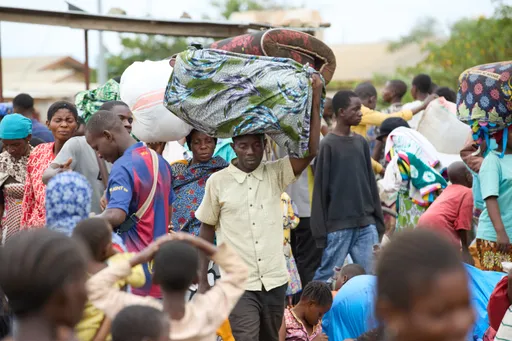By Firmain Eric Mbadinga
The pyramids of Egypt hold many secrets, some confounding, others intrinsic to the magic of nature.
In 2015, archaeologists unearthed 3,000-year-old clay jars covered in dust and cobwebs within these ancient structures.
What astonished many observers was the state of their contents — natural honey that had retained its flavour and quality despite millennia of entombment.
While this discovery amazed laypeople, beekeepers weren't surprised.
They knew that honey possessed remarkable virtues, including an extraordinary ability to withstand the test of time.
It is this very array of qualities that captivated Déborah Nzarubara, a Congolese woman from the conflict-ridden eastern city of Goma, and inspired her to invest in beekeeping.
Sweet enterprise Green Community Mind (Grecom), the company Déborah founded in 2018, has steadily expanded its market presence, increased its workforce, improved its financial performance, and diversified its product offerings.
Through her management approach and daily efforts, Déborah has dedicated herself to transforming the often-negative perception of beekeeping within her community while also modernising the practices of what is still a hobby for some.
“Having been born and raised near Virunga Park, I have seen beekeepers at work from an early age. My parents were beekeepers themselves, and my husband is also one. This proximity has enabled me to see first-hand the difficulties associated with this profession in our country. I know that beekeepers are sometimes stigmatised,” Déborah tells TRT Afrika.
“Some are accused of witchcraft because of their ability to supposedly tame bees. Others face scorn because of the perception that this career is the choice of those who cannot study. By training myself and getting involved in beekeeping, I intend to bring about a change in mindset.”
Some are accused of witchcraft because of their ability to supposedly tame bees. Others face scorn because of the perception that this career is the choice of those who cannot study. By training myself and getting involved in beekeeping, I intend to bring about a change in mindset.
Déborah, who studied at the Institut Supérieur de Développement Rural in Goma and graduated as a senior technician, created an NGO in 2013 to help beekeepers.
Action Solidaire pour la Protection des Abeilles trains beekeepers in new, more environmentally friendly techniques of harnessing bees for honey.
“The training courses have had a major impact, enabling beekeepers to abandon techniques that had a negative impact on biodiversity and honey production, besides being lethal for the bees,” explains Déborah.
Expanding network
Implementing improved working methods quickly led to increases in both the quality and quantity of honey, prompting producers to explore broader markets.
In 2018, Grecom established a modern, ecologically sound honey production and sales framework.
Trained beekeepers constructed modern hives using local materials, built smokers, and designed more appropriate protective gear.
This systematic reorganisation of practices and investments in equipment, logistics, and workplace improvements soon yielded results.
Creative marketing strategies and attractive packaging helped make honey, already naturally endowed with healthy properties, even more appealing to customers.
Initial doubts about the product's local origins were dispelled through awareness campaigns conducted by Grecom.
The exceptional flavour of the packaged honey was the clincher.
"The strategy has proven successful. We explained our packaging techniques to achieve honey of such quality. Trust was gradually established. We have since secured contracts with dozens of boutiques and stores,” says Déborah.
Grecom now offers an extensive range of products spanning mead, beeswax, propolis, and even honey ointment.
From its origins in Goma, Grecom honey has expanded its reach to win over consumers in Kinshasa and Bukavu.
It also reaches enthusiasts in Germany, Belgium, and the US through an export chain.
Changing perceptions
The success of Déborah’s endeavour has not only improved beekeepers' incomes but also elevated their standing within the community.
The NyukiTech application maps active beekeepers, facilitating coordination, solidarity, and training opportunities throughout the apiculture industry.
Information about climate risks and production techniques is regularly exchanged, and SMS communication enables beekeepers across the Democratic Republic of Congo to support each other in various capacities.
Déborah, a mother of four, typically maintains a low profile. While cherishing her family more than anything else, she takes pride in the positive transformations she and her colleagues have brought to the beekeeping sector in her native country.
A decade since foraying into the intriguing world of bees, she notes that women, including herself, face less stigma, and people generally show a greater appreciation for beekeepers and bees.
Déborah's professional journey and entrepreneurial dedication have earned her accolades from financial institutions, including the World Bank and the African Development Bank.
Under her leadership, Grecom has created dozens of jobs, established a cooperative for beekeepers, and plans to develop a research centre specialising in bees and beekeeping as an economic activity.
Resilience amid adversity
All of Déborah's efforts and dreams were nearly shattered when, a week after TRT Afrika interviewed her, the city of Goma fell to M23 forces and their allies.
Like many residents, Déborah was deprived of water, electricity, and internet for weeks.
Her facilities suffered damage during the fighting and subsequent looting.
But Déborah’s resilience in the face of odds keeps her going.
She retains faith in a stable, better future for her city and country, hoping to resume her mission of transforming beekeeping in the DRC soon.
➤Click here to follow our WhatsApp channel for more stories
























